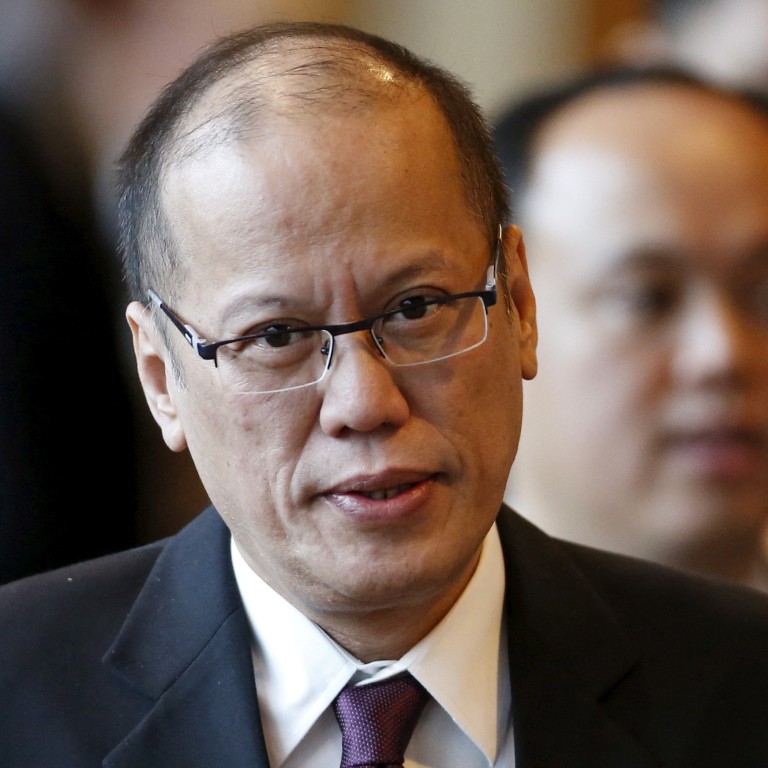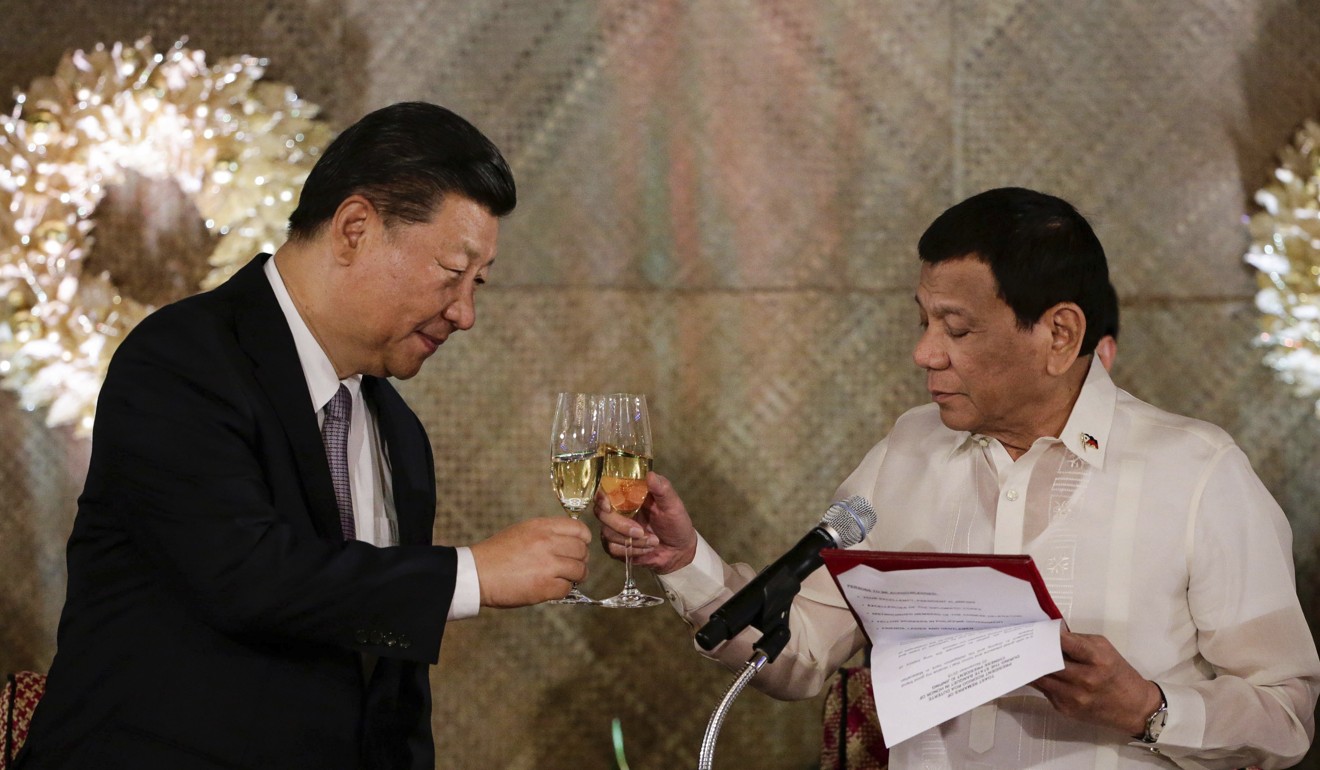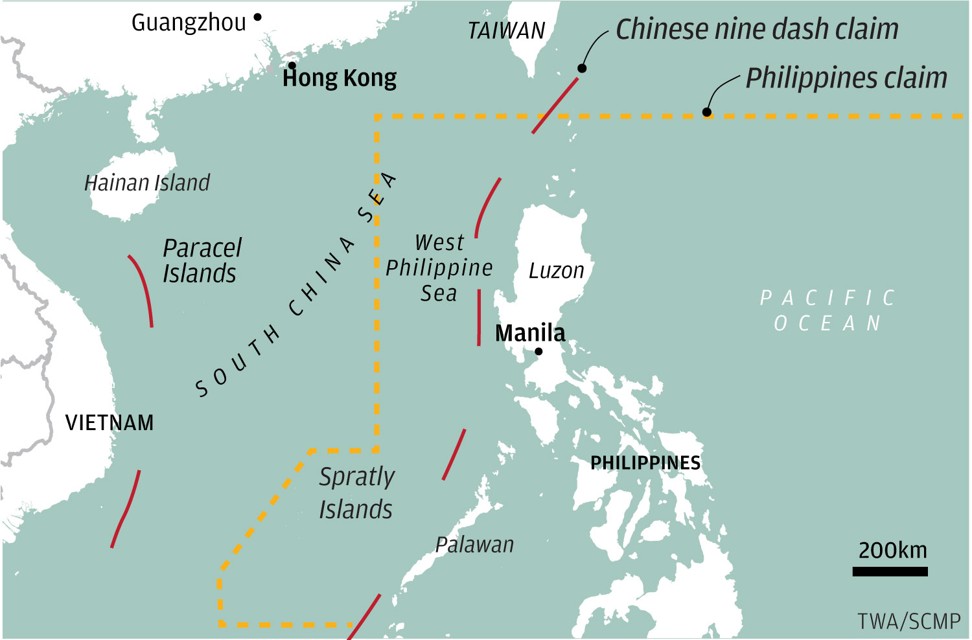
Former Philippine president Benigno Aquino slams joint deal on South China Sea, cites different numbers from Duterte government
- President Rodrigo Duterte’s administration has previously said it is open to joint energy exploration on the basis of a 60/40 revenue-sharing formula
- Yet according to the former leader, who is known as a China hawk, Beijing will get the lion’s share in any future deal
Former Philippine President Benigno Aquino, known for his hardline views on China, on Tuesday appeared to contradict the terms of a deal his successor Rodrigo Duterte is making with China, as he sharply criticised plans for joint energy exploration in the disputed South China Sea.
The Duterte administration has previously said it was open to cooperation on the basis of a 60/40 revenue-sharing formula skewed in its favour – yet according to Aquino, it is China that is going to get the lion’s share.

“We used to have a joke in the cabinet in our administration, that China seems to be saying one thing: ‘What is ours is ours, what is yours we share’,” he said at a book launch.
“When I saw the proposal to have joint exploration and … exploit the resources to the tune of 60/40, 60 for the Chinese side, I was wondering if the joke was now a reality. We will share and exploit your resources but we will gain more from this adventure.”
The former leader said it was indefensible to share “what is ours with another entity that gets an even bigger slice of the pie”.
China and the Philippines signed a memorandum of understanding in November on negotiating an agreement for joint energy exploration, but there has not been any official correspondence on how the revenue will be split.
There is also no consensus on who will have sovereign rights over the oil and gas that is extracted, given that both countries claim the area as their own territory.
Progress between China and the Philippines can’t guarantee peace in the South China Sea
Philippine officials, including Duterte, have said they view a 60/40 split in Manila’s favour as a fair ratio to adopt. But local researchers have noted that China is likely to want the two sides to share the costs of exploration, which goes against such a division of revenue.
Aquino was not picked up on his apparent numerical blunder at the question-and-answer session following the book launch, but he was asked about one of the landmark foreign policy moves of his administration: filing an arbitration case against Beijing in 2013 over its disputed claims in the South China Sea.
That decision — and the subsequent ruling in 2016 by the Permanent Court of Arbitration in the Hague that found in Manila’s favour — is recalled in the book that was launched at the event.
At the time, China reacted furiously to the court’s pronouncement and vowed not to recognise it – capping off three years of frosty relations between the two nations that only began to thaw after Aquino left office in June that year.
As Aquino’s successor, Duterte has taken a significantly softer stance on the sea dispute and sought cooperation with China in other areas, which he calls a “pragmatic” approach.
“China is already in possession of the [South China Sea]. It’s now in their hands. So why do you have to create frictions?” he said last November at the sidelines of a regional summit in Singapore.
Aquino’s camp has described this position as “defeatist”, a stance the former leader reiterated on Tuesday as he questioned whether it was feasible for the two countries to have a relationship of “strategic cooperation”, using the language Duterte and Chinese President Xi Jinping had used when Xi visited the Philippines in November.
Bangsamoro autonomy vote in southern Philippines proves peaceful, apart from a grenade
“This strategic partner will conflict with itself if there comes a conflict between their side and our side,” he said.
“If they are not bound by a system of laws, any agreement that you enter with them might be a changing reality. The only constant would be what is in the interest of the [Chinese Communist] Party.”

However, the former leader counselled that the “idea of dialogue” should not be abandoned, adding that both sides could “come to an understanding”.
He suggested that the international community had leverage over Beijing because China “needs the rest of the world to grow at the pace that it has grown”.
“To be able to do that, there has to be confidence in the other trading partners that [they] will be treated right and we who belong in the same region have grounds to say you haven’t treated us right,” he said.
Additional reporting by Raissa Robles in Manila


